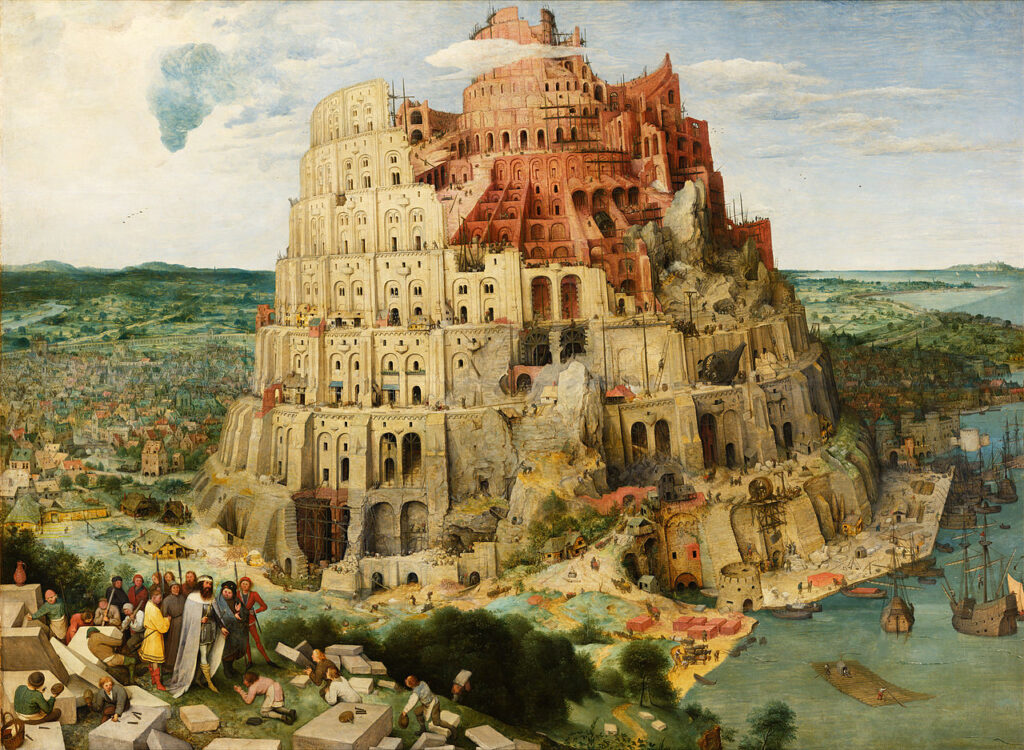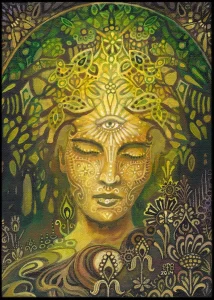
Note: Dear friends. This morning I learned that for some reason, very few subscribers to my blog received this post today, which is a repost from one originally published seven years ago. If you are one of the few who did receive it today, you can disregard this one.
When the human animal developed an ego our species began a long, slow separation from Nature. What was once a guilt-free ride in the unconscious maternal matrix where instinct ruled, unchallenged, became an arduous trek through the tangled jungles of fear, guilt, self-torment, and self-doubt. For the first time we reflected on the consequences of acting on our obsessive urges. We discovered the values of planning ahead and using self-restraint. And we bowed in respect to the rare members of our tribes who demonstrated the benefits of living with these and other new skills.
Something miraculous was happening to us. No longer were we merely crude instinctual vessels whose only aims were procreation and survival. We were evolving into consciousness.This is the metaphorical meaning of the Old Testament story of the tower of Babel (Genesis 11: 1-9).
At that time all mankind spoke a single language. As the population grew and spread eastward, a plain was discovered in the land of Babylon, and was soon thickly populated. The people who lived there began to talk about building a great city, with a temple-tower reaching to the skies—a proud, eternal monument to themselves.
“This will weld us together,’ they said…But when God came down to see the city and the tower mankind was making, he said, ‘Look! If they are able to accomplish all this when they have just begun to exploit their linguistic and political unity, just think of what they will do later! Nothing will be unattainable for them! Come, let us go down and give them different languages so that they won’t understand each other’s words!” (The Living Bible Paraphrased. Carmel, New York: Guideposts Associates, Inc. 1971, p. 8)
In this story the people are hoping to re-create the golden paradise of unity in which they luxuriated before they became self-aware. But the jealous Old Testament God has a very different perspective. He sees their wish as prideful and self-centered just as he sees Eve’s desire to know the difference between good and evil as selfish and disobedient. So he punishes them by separating them from all that feels familiar and safe and cursing them with the confusion and mistrust that naturally arise between different cultures.
But who is the “us” God refers to when he says, “…let us go down and give them different languages so that they won’t understand each other’s words”?
An even more problematic question is,“Why would God want to confuse humanity?” Could this really be the intent of an authentically benevolent deity or has another, unconscious force been shaping our ideas and stories about God?
Let’s begin with my first question. In Biblical, Apocryphal and Gnostic traditions, Sophia symbolized God’s Wisdom. In Judaism the Shechinah was God’s female persona.
 Feminine wisdom was the partner of the God of logos from the beginning, but we saw less of her as the ego grew stronger in its grand march through the ages. The reason for this lies in the natural development of our psyches. If consciousness was evolution’s gift to us, dualism was its curse. Recognizing our choices gave rise to conscience and moral responsibility, and we became conflict-ridden crucibles of transformation. What had once been a unified, albeit unconscious psyche, was changing into a house divided against itself. And as we changed, our God-images changed.
Feminine wisdom was the partner of the God of logos from the beginning, but we saw less of her as the ego grew stronger in its grand march through the ages. The reason for this lies in the natural development of our psyches. If consciousness was evolution’s gift to us, dualism was its curse. Recognizing our choices gave rise to conscience and moral responsibility, and we became conflict-ridden crucibles of transformation. What had once been a unified, albeit unconscious psyche, was changing into a house divided against itself. And as we changed, our God-images changed.
This was the situation at the stage of the ego’s growth represented by the story of the Tower of Babel. Our species had long been banished from Eden’s paradise of childhood innocence and had evolved into conflicted teenagers. One part of us yearned to return to the comforts of unconsciousness and irresponsibility, the other wanted to push on to express our individuality. To the young ego, both choices were profoundly attractive, and both were intolerable.
Was it really a jealous God who wanted to confuse and separate humanity? Or was this God-image the creation of a confused adolescent ego? In fact, dualistic thinking was separating us from our original sense of unity and part of us wanted to preserve it by “erecting a monument” to it. But to the other part, returning to the unconscious state it associated with the maternal matrix felt like death!
So the fearful, ambitious part of our ego took the lead and aligned itself primarily with “masculine” values like toughness, goal-oriented striving, separating, discriminating, and individuating, and projected these values onto a masculine Sky God of logos. Correspondingly it disowned “feminine” values, and to escape its guilt about abandoning Great Mother, it assumed “God made me do it!”
Jungian analyst Marion Woodman described the feminine principle In an interview with Robert Johnson:
The feminine principle attempts to relate. Instead of breaking things off into parts, it says, Where are we alike? How can we connect? Where is the love? Can you listen to me? Can you really hear what I am saying? Can you see me? Do you care whether you see me or not?
Next time, Mandorla Consciousness, Part II.
Note: This post and the next one (both are slightly edited here) were originally published by the Center for Action and Contemplation under the title, The Mandorla Consciousness. Radical Grace, Summer 2012, vol. 25, no 3, p. 18.
Image Credits: Google Images, Tower of Babel, Pieter Bruegel the Elder. Etsy, Sophia Goddess of Wisdom
Jean Raffa’s The Bridge to Wholeness and Dream Theatres of the Soul are at Amazon. Healing the Sacred Divide can be found at Amazon and Larson Publications, Inc. Jean’s new Nautilus Award-winning The Soul’s Twins, is at Amazon and Schiffer’s Red Feather Mind, Body, Spirit. Subscribe to her newsletter at www.jeanbenedictraffa.com.




6 Responses
Thank you for those beautiful and valuable insights ♡♡
Thank you, Vera. I’m glad to know you appreciated this post! Jeanie
Thanks Jeanie. A complex issue beautifully expressed. The wheel keeps on turning; the feminine is ascending for a the good of all. Love, susan
It does seem to be happening, but there’s still so much resistance that I doubt it will be soon! We thought the Supreme Court’s Roe vs.Wade ruling in 1973 to protect a pregnant woman’s liberty to choose to have an abortion would mark a new era but now it’s ruled to overturn it! The fear of feminine power and freedom runs very deep.
First, I must confess I didn’t know that in Jewish belief (Torah?) It is God’s female persona.
Second, as I read your excellent article, I feel somehow synchronised; in the development of our ego (right now, I am trying to write about Jung’s child archetype) and also as I have a hot discussion with Iranian people from all over the country about their different languages (it is a long story) I told them about Babilon’s tower in the old testament and how they suddenly couldn’t understand each other! Anyway, your point of view is brilliant. Sincerely, Aladin.
Yes. I found an article you can read about Sophia here. It’s based on the Biblical references to wisdom: http://holyspirit-shekinah.org/_/sophia_lost_goddess_of_wisdom.htm
I love the synchronicity of you and I working on some of the same themes at the same time. That happens to Susan and me a lot too.
The Shekinah was a name the Hebrews gave to the pillar of light that guided them out of the wilderness. Here’s what I found on the internet about its meaning: “(in Jewish and Christian theology) the glory of the divine presence, conventionally represented as light or interpreted symbolically (in Kabbalism as a divine feminine aspect).” Many scholars connect it with Christianity’s Holy Spirit: the feminine aspect of God within us.
Thank you for your kind words about this post. Warmly, Jeanie